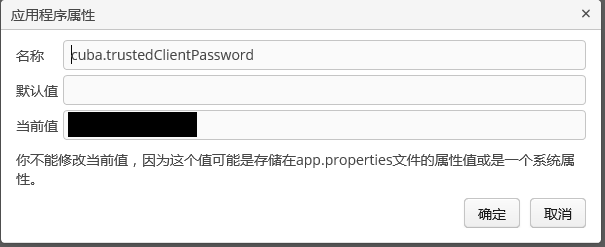最直接的办法是,使用AppContext.getProperty("cuba.trustedClientPassword");
可以获取到系统中的web模块下的wep-app.properties和 core模块下的app.properties文件中的配置信息(core是业务,web是UI),但是不推荐这么使用。
推荐使用Config代替AppContext
在web模块中使用WebAuthConfig
@Inject
private WebAuthConfig webAuthConfig;
获取:
webAuthConfig.getTrustedClientPassword();
在core模块中使用ServerConfig
@Inject
private ServerConfig serverConfig;
获取:
serverConfig.getTrustedClientPassword();
这两个类有同样的这个方法
@Source(type = SourceType.APP) public interface WebAuthConfig extends Config { @Property("cuba.trustedClientPassword") @DefaultString("") String getTrustedClientPassword(); } @Source(type = SourceType.APP) public interface ServerConfig extends Config { @Property("cuba.trustedClientPassword") @DefaultString("") String getTrustedClientPassword(); }
而cuba.trustedClientPassword = **********,这个配置,是配置在web-app.properties里的。ServerConfig也是可以获取到的。
注意:这种使用方法只能用在Bean中,而不能在普通的jaca类里,因为要使用到注解,而只有Bean才能被容器管理,才可以使用注解。
新建属性
上面的两个属性,都是cuba系统自带的属性,那两个类也是写在jar文件中的。如果是自己新增的需要,需要自定义一个Config类,继承Config类就可以。
如下:
//定义属性类类 @Source(type= SourceType.DATABASE) public interface CAConfig extends Config { @Property("ucenter.CA.pdf.sign.enable") @DefaultBoolean(false) Boolean getCAPDFSignEnable(); } //调用时 @Inject private CAConfig caConfig; //获取 caConfig.getCAPDFSignEnable()
在运行时修改属性
刚开始把属性获取到以后,直接放到了全局静态变量里了
public static final String CUBA_TRUSTED_CLIENT_PASSWORD = AppContext.getProperty("cuba.trustedClientPassword");
但是这样的坏处是:如果在项目运行时修改了属性,就必须重启系统才能生效,这明显是不好的。所以不应该使用上面的方法,而之前的办法在项目运行是进行修改,也会实时得获取到。
那么怎么修改呢?
使用【管理员】登陆,在【管理】-【应用程序属性】下可以搜索到:

编辑:
